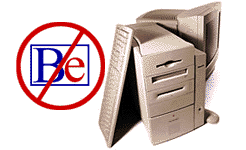
Be OS and the G3 Power PC: Not to Be?By Greg Lindsay
|
Apple's gradual improve- ments in motherboard design are forever off limits |
|
| Early tests indicate that the OS runs more stably on X86 processors anyway | |
|
"We expect all of our business to be on Intel within a year" |
More of the fallout from Apple's decision to bump off its cloners last Fall has settled over the Valley recently, falling particularly hard in Menlo Park, home of Be Inc.. It seems Apple has been loath to hand over the documentation for the "Gossamer" motherboard line of PowerPC 750 machines (popularly referred to as the "G3" line) that began shipping last November.

In the past, Apple had been more than happy to hand over the documentation to its various motherboard designs, each having colorful names like Alchemy, Tanzania, and Tsunami. But the return of Jobs has chilled the once congenial relationship the two companies had, although both Motorola and IBM are more than happy to provide the BeOS team all the technical specs they desire.
The result for Be users on PowerPC machines (right now they're the only kind, although BeOS for Intel is due in March) is that Apple's gradual improvements in motherboard design are forever off limits, forcing them into an upgrade path (if they choose to even stay on the PowerPC platform) dependent upon the processor upgrade cards offered by companies like Newer Technologies and PowerLogix.
While Alex Osadzinski, Be's VP of sales and marketing, says he doesn't want to blow the story of Apple's refusal out of proportion, he also says he can't figure the reasoning behind the company's decision. "The stated reason is that the motherboard design is only available to MacOS licensees, but because there are no more licensees [at least not for Apple's new motherboards, anyway], it's sort of a circular argument."
While Be's FAQ for Power Mac systems currently reports that the OS will not run on G3 upgrade cards, Osadzinski assured me that any incompatibilities with Apple's G3 machines is the result of the motherboards, and that upgrade cards will in fact work.
"The issue with Apple's machines has never been the processor. Motorola is being incredibly helpful. We've never had any problems getting any documentation from them." Osadzinski also figures that in theory, Be could legally try to reverse engineer the boards by "hooking up a logic analyzer and poking it, but the work involved wouldn't be worth it. Imagine trying to reverse the Pentium instruction set. It'd take years."
Although deprived of future growth on PowerPC machines due to the end of cloning and Apple's stubborness, Be isn't particularly worried about its the future. The forthcoming Intel release will vastly expand Be's potential market, and early tests indicate that the OS runs more stably on X86 processors anyway.
"The only thing it means to me," says Osadzinski, "is that all PowerPCs are PowerMacs. We expect all of our business to be on Intel within a year. But no one wants to see Apple fail. We want the PowerPC platform to stay alive, especially since 100% of our customers are running Macs."
But the larger question for Be on the PowerPC platform is whether the content creation market -- Be's vowed target and the strongest Apple bastion -- will stick around on BeOS-capable hardware long enough to reap the benefits of the new OS. In their quest for better performance, many are jumping to Apple's new machines for the speed boost and worrying about their OS choice later.
The good news for Be in the short term is Apple's apparent cancellation of the "PowerExpress" project, a G3 Mac which would have packed a faster processor, a faster bus, and most importantly for digital media pros, a SCSI hard drive much faster than the EIDEs shipping in the current version and six PCI slots, as opposed to the current models' three. The lone cloner UMAX has stepped into this space with its S900BASE machine, a six PCI slot, SCSI hard drive Tsunami clone that also ships with a $500 coupon for a Newer Technologies G3 upgrade card. UMAX further cemented its bond with Be by declaring it will bundle the BeOS with every machine it ships from now on.
But UMAX's license runs out this summer, and whether it will seek to renew is very much in doubt. If it goes, the only recourse for MacOS users taking a serious look at Be will be the upgrade cards. And while they make do on aging motherboards, it appears that the OS of the future will have Intel inside.
Greg Lindsay is a Contributing Editor for the Netly News Network.
Copyright © 1997 OS News